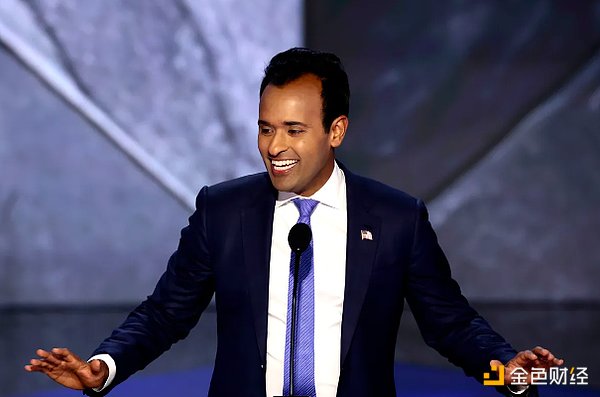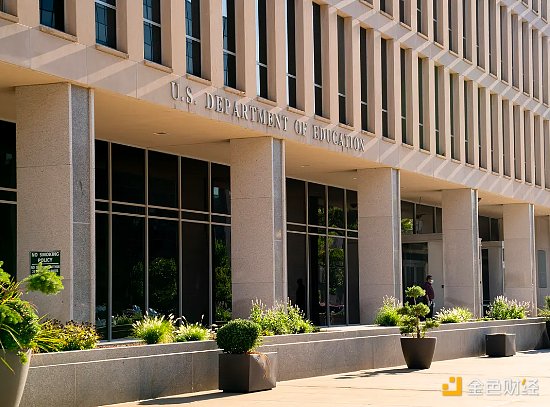By Gregory Korte, Bloomberg; Translated by 0xjs@黄金财经
President-elect Donald Trump wants to abolish the federal bureaucracy and even eliminate at least one federal department. To do so, he is creating a new agency called the Department of Government Efficiency (DOGE).
If the name sounds like a meme, that's because it is a meme. DOGE is the brainchild of billionaire Elon Musk, who came up with the acronym to pay homage to the mascot of his obsessive digital currency, Dogecoin.
The plan is ambitious: cut $2 trillion from government spending. The overall goal of streamlining government and making it more efficient has confounded multiple presidents, both Democrats and Republicans, and the plan led by Musk is likely to face political opposition, just as previous efforts to cut the deficit have.
The efficiency effort will be led by two people: Musk and entrepreneur Vivek Ramaswamy, who challenged Trump for the Republican presidential nomination.
1. What is the Department of Government Effectiveness?
Let's start with what it is not. It is not a department, as departments are permanent and can only be created or dissolved by Congress. Instead, Trump has said the organization will operate outside of government and be dissolved in July 2026.
2. How will it work?
It's not clear yet. One possible mechanism is through the Federal Advisory Committee Act, a 1972 law that allows the president to seek advice from a committee made up of public and private sector players. Trump could create such a committee through an executive order, in which case it would likely become one of about 1,000 federal advisory committees -- which together cost $399 million last year.
3. Is this unethical?

Vivek RamaswamyPhotographer: Eva Marie Uzcategui/Bloomberg
Having Musk and Ramaswamy on a federal advisory committee would make them so-called special government employees. These positions can be unpaid and allow individuals to work for a federal agency or the White House for up to 130 days. An important consideration for Musk and former biotech executive Ramaswamy: These positions do not require individuals to publicly disclose or divest their assets.
Still, Musk and Ramaswamy would still be subject to federal ethics laws requiring them to recuse themselves from discussions and decisions that affect them personally. That could complicate matters for Musk, whose SpaceX alone has more than $15 billion in federal contracts. Musk’s companies have also been targeted by at least 20 federal regulators, according to an investigation by The New York Times.
4. What is DOGE’s goal?
Trump said the group would “provide advice and guidance from outside government and will work with the White House and the Office of Management and Budget to drive massive structural reforms and create an unprecedented approach to government entrepreneurship.” He called the plan the “Manhattan Project” of our time.
5. How much spending does DOGE want to cut?
Musk set a goal of $2 trillion in spending cuts, but it’s unclear whether that’s annual savings or savings within a 10-year budget window. Trump used an annual figure in his statement, suggesting the former: “We will eliminate a massive amount of waste and fraud that exists in $6.5 trillion in annual government spending.”
6. Why hasn’t this been done before?
It is — though it has never been. Washington is littered with spending cuts that have never been implemented. In 2010, the Simpson-Bowles Commission proposed $4 trillion in cuts over about a decade by pushing back the Social Security retirement age, capping health care costs, and eliminating tax deductions. Congress never acted. Then a new congressional committee, known as a supercommittee, tried to find a "grand bargain" for President Barack Obama and congressional Republicans in 2011. It failed. Republicans tried to use multiple government shutdowns and a debt ceiling standoff to force a budget reckoning, but ended up with only short-term fixes. Trump himself promised in 2016 that he would balance the budget "fairly quickly," but by the time he leaves office in 2021, the U.S. debt is at record levels.
7. Why is it so hard?
Major deficit reductions would require a degree of austerity not seen since World War II and would likely include deep cuts to popular programs like Social Security, Medicare, Medicaid, and veterans benefits.
8. What's on the chopping block?

U.S. Department of Education. Photographer: Erin Scott/Bloomberg
Trump has pledged to close the Department of Education and hand control of policy and funding back to the states. Republican Rep. Darrell Issa, who spoke with Musk shortly after the election, said Musk was particularly interested in finding and eliminating Medicare fraud and expanding the sale of public lands.
9. What about waste, fraud and abuse?
Trump said the commission would target "a lot of waste and fraud." But cutting "waste, fraud and abuse" has long been a mantra for conservative politicians, and efforts to achieve that goal have been mixed. The GAO estimates that federal agencies lose between $233 billion and $521 billion a year to fraud. The biggest culprit was the coronavirus spending package signed into law by Trump in 2020; a 2023 Associated Press review found that 10% of the $4.2 trillion in pandemic relief funds was misused. Waste is a more subjective issue. Since 2011, the GAO has submitted 14 reports to Congress with 2018 recommendations aimed at reducing or eliminating duplication or reducing federal government costs. Congress adopted about two-thirds of them, saving about $667.5 billion.
10. How will the public know about DOGE's proposal?
Federal law requires advisory committee meetings to be public, and Musk himself has promised that all actions will be "published online for maximum transparency." He also hinted that there may be some game-like public comments. "We will also set up a leaderboard of the craziest abuses of taxpayer money. It will be both very tragic and very interesting," he said.
11. Can Trump do this without Congress?
Trump does not need Congress to approve Musk's position, but Congress holds spending power under the Constitution and any cuts must be approved by Congress. However, Trump thinks he has found a way around it. He plans to challenge a key provision of a 1974 law that forms the basis of the modern federal budget process. The provision, called the Budget Control Act, states that the president must spend appropriations unless Congress decides to revoke it. "Restoring the Budget Control Act will give us a critical tool to eliminate the deep government, drain the swamp, and starve the warmongers," Trump said last year. "With the Budget Control Act, we can easily cut off funding."
 JinseFinance
JinseFinance
 JinseFinance
JinseFinance YouQuan
YouQuan YouQuan
YouQuan Davin
Davin Beincrypto
Beincrypto Bitcoinist
Bitcoinist Cointelegraph
Cointelegraph Bitcoinist
Bitcoinist 链向资讯
链向资讯 Cointelegraph
Cointelegraph